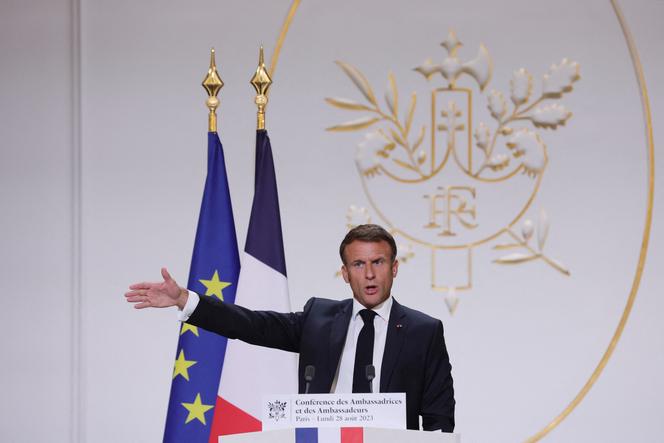


The coup in Niger, devastating for France's commitment to the Sahel, is weighing on Emmanuel Macron's diplomatic return. This summer, the president followed the day-by-day twists and turns of the military coup of July 26 against one of Paris' closest allies on the African continent, President Mohamed Bazoum, who has since been sequestered with his family. As Niger's coup plotters stepped up their pressure on Paris, Macron attempted, on Monday, August 28, at the opening of the 29th conference of French ambassadors at the Elysée Palace, to defend France's presence in a country at all costs. This, without abandoning any of the firmness displayed since the putsch, even if it means antagonizing the new regime.
"The weakness that some have shown toward previous putsches has fed regional vocations. There is an epidemic of putsches throughout the Sahel," asserted the French president, referring to the successive military coups that have taken place over the past three years in Mali, Burkina Faso, Guinea and Niger. It was a way of showing that France continues to hope that President Bazoum will return to business in Niamey, and intends to maintain its presence in the country, against the advice of the ruling junta. In Niger, "our policy is simple," he added. "We do not recognize the putschists, we support a president who has not resigned, and to whose side we remain committed. And we support a diplomatic solution, or a military one when it is decided, by ECOWAS [the Economic Community of West African States]."
Sylvain Itté, the French ambassador to Niger, who was ordered to leave the country by the junta on Friday, was one of the rare absentees from the three-day gathering of French ambassadors in Paris. Macron paid tribute to his work in Niamey. For the French authorities, there is no question of Itté returning to Paris under these conditions. "I think our policy is the right one. It is based on the courage of President Bazoum, on the commitment of our ambassador on the ground, who remains despite all the pressures, despite all the declarations by the illegitimate authorities," insisted Macron.
Since the coup, Macron and his entourage consider that the situation in Niger is not similar to those they faced in Mali and Burkina Faso, two states from which France withdrew after putsches against elected presidents. "France's position towards the Niger junta was from the outset firmer than that initially adopted in Mali, when the first coup d'état took place in 2020, and then in Burkina Faso in January 2022. Whereas in the two previous cases, Paris had given itself a chance to work with the putschists, in Niger relations became strained in just a few days," said Elie Tenenbaum, Director of the Center for Security Studies at the French Institute of International Relations (IFRI). "While the United States has remained more reticent in its denunciation of the junta – and does not formally speak of a 'coup d'état' – the rejection of France by the new Niger authorities is also the result of this differentiated approach," added the researcher.
You have 62.78% of this article left to read. The rest is for subscribers only.
